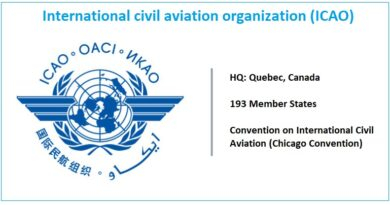NATO Described China as a security risk
Context:
The recently held North Atlantic Treaty Organization (NATO) summit for the first time has explicitly described China as a security risk.
About NATO:
- The North Atlantic Treaty Organization (NATO), also called the North Atlantic Alliance.
- It is an intergovernmental military alliance between 30 European and North American countries.
- The organization implements the North Atlantic Treaty that was signed on 4 April 1949.
- NATO constitutes a system of collective defence whereby its independent member states agree to mutual defence in response to an attack by any external party.
- NATO’s Headquarters are located in Haren, Brussels, Belgium, while the headquarters of Allied Command Operations is near Mons, Belgium.
- Since its founding, the admission of new member states has increased the alliance from the original 12 countries to 30.
- The most recent member state to be added to NATO was North Macedonia on 27 March 2020.
- NATO currently recognizes Bosnia and Herzegovina, Georgia, and Ukraine as aspiring members.
- The combined military spending of all NATO members in 2020 constituted over 57% of the global nominal total.
- Members agreed that their aim is to reach or maintain the target defence spending of at least 2% of their GDP by 2024
- India is not member of NATO
Contents
Why was NATO formed?
The organisation was formed as a means to ensure collective security in western Europe. Even though World War 2 had come to an end, the deteriorating relations between two former allies, the United States and the USSR would eventually lead to the Cold War. The USSR sought to expand its influence in Europe through the spread of communism, while the US saw the ideology of the USSR as a threat to its way of life. Hence it saw the need to form NATO.
NATO and China:
- China has never figured in NATO summit declarations before, except for a minor reference in 2019 to the “opportunities and challenges” it presented.
- But China’s stated ambitions and assertive behaviour present systemic challenges to the rules-based international order and to areas relevant to NATO security.
- NATO leaders declared China a constant security challenge and said the Chinese are working to undermine global order.
- This is in sync with US President efforts to get allies to speak out with a more unified voice against China’s trade, military and human rights practices.
- The US’ growing conviction is that China is a threat to its global supremacy and must be contained.
- However, both France and Germany sought to put some distance between NATO’s official position and their own perception of China.
- NATO’s European member states may view China as an economic rival and adversary, but they are unconvinced by the American line that it is an outright security threat.
- NATO leaders declared China a constant security challenge and said the Chinese are working to undermine global order.
- The other two threats identified by the NATO communiqué are on predictable lines: Russia and terrorism.
China’s Stand:
It has urged NATO to “view China’s development rationally, stop exaggerating various forms of ‘China threat theory’ and not to use China’s legitimate interests and legal rights as excuses for manipulating group politics artificially creating confrontations”.
Should India join- Argument for
- Post cold war NATO has built partnerships with many neutral and non-aligned states.
- Article 5 provides that if a NATO ally is attacked, each and every other member of the alliance will consider this attack against all members and will take the actions it deems necessary to assist the ally.
- It would create deterrence for Pakistan and China to attack India.
- NATO has regular consultations with both Russia and China, despite the gathering tensions with them in recent years. Reluctance from the Indian side does not make any sense.
- An India-NATO dialogue would simply mean having regular contact with a military alliance, most of whose members are well-established partners of India.
- In the longer term, India would derive military-strategic benefits from a partnership with the world’s most powerful alliance.
- Delhi is eager to draw a reluctant Russia into discussions on the Indo-Pacific, whereas it makes little sense in avoiding engagement with NATO, which is now debating a role in Asia’s waters.
- A sustained dialogue with NATO could facilitate productive exchange of ideas about terrorism, changing geopolitics, the evolving nature of military conflict, military technologies and new military doctrines.
- India has military exchanges with many members of NATO including the US, Britain, and France in bilateral and multilateral formats. Then a collective engagement should not be a problem.
- It is the era of multilateralism. Even India and China are aligned together in SCO and WTO. In WTO both countries are against USA but militarily USA and India oppose China.
Should India join- Arguments against
- India still is heavily dependent on the Russian military equipment. Joining NATO will irk Russia.
- NATO members have conflicting opinions about sharing the military burden and its military operations.
- Russia has shown displeasure over India’s growing strategic convergence with the US.
- India’s proximity with NATO could further strengthen the already deepening relation between China-Russia, Pakistan-Russia.
- Establishment of NATO bases on India’s territory might invite widespread protests in the country; it may even be seen as an infringement of our sovereignty.
- India would get dragged into various conflicts. This would result in a lot of Indian soldiers dying in conflicts in which we have no reason at all to get involved.
Source: The Hindu
North Atlantic Treaty Organization (NATO)
Discover more from Simplified UPSC
Subscribe to get the latest posts sent to your email.



